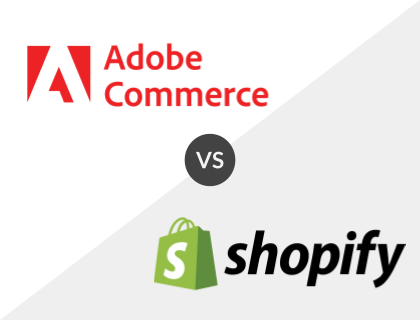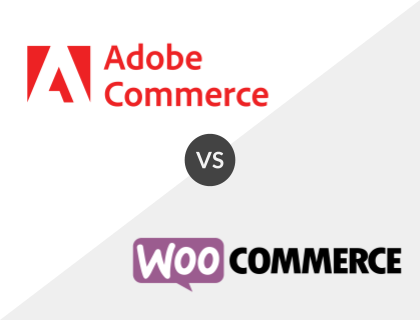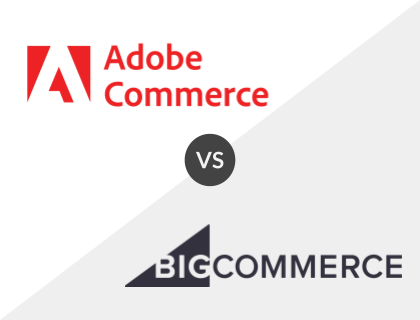Adobe Commerce
A complete review of Adobe Commerce including pricing, comparisons to competitors, key information, and FAQs.
Updated on November 24th, 2023
The SMB Guide is reader-supported. When you buy through links on our site, we may earn an affiliate commission. Learn more
Adobe Commerce, formerly Magento, is an e-commerce software that's been used by over 250,000 businesses and merchants globally. The platform is part of Adobe Experience Cloud and allows businesses to build, customize, and manage their e-commerce websites, optimized for heavy traffic and easy checkouts.
Free Trial
BigCommerce
Get more features out-of-the-box to build, run and scale a better online business — without the hidden fees.
Fast eCommerce templates.
Excellent customer service.
99.99% average uptime.
At-a-Glance:
Feature | Adobe Commerce |
|---|---|
Staring price | Contact for quote. |
Free version | Yes. |
Transaction fee | Contact for quote. |
24/7 technical support | Online store, social media, online marketplaces, and physical stores. |
Multiple sales channels | ✓ |
Supports multiple currencies | ✓ |
Customization tools | ✓ |
Open-source | ✓ |
Review:
Adobe Commerce, powered by Magento, is a powerful, flexible, and highly scalable e-commerce solution that offers a great range of customizability. The platform features multiple integrations and extensions and is designed to handle large-scale online stores with thousands of products and high website traffic.
Adobe Commerce is suitable for small, medium, or enterprise businesses. However, the platform requires coding knowledge and may not be a viable solution for users with no prior development experience.
Pros:
- Adobe Commerce can be customized to a very high degree.
- Magento Open Source is a version of the platform that businesses can download and use for free.
- The company offers 24/7 customer support via phone and email.
- The open-source architecture makes the platform highly customizable.
- Adobe Commerce features thousands of extensions on the Magento Marketplace.
- SEO is natively configured in the platform.
- The platform features a range of management and analytics tools.
- Other services include automated data backup, image optimization, and core applicant support.
- Adobe Commerce multiple currencies worldwide.
Cons:
- Adobe Commerce's pricing is not available on their website.
- The platform requires knowledgeable software developers to operate.
- Pre-built website templates from the Magento Marketplace cost extra.
- While Magento Open Source is free, there are associated costs, such as hosting and processing fees.
Reputation:
On TrustRadius, Adobe Commerce has a 7.9-star rating with many users praising its customization options and scalability. However, some users reported encountering bugs, integration issues, and technical difficulty in getting the system working.
Magento Open Source also received favorable reviews on G2 with a 4-star rating, and TrustRadius with a 7.6-star rating, citing the flexibility and rich features of the platform as highlights.
Pricing:
While Adobe Commerce's pricing is not readily available on their website, the platform offers an open-source version called Magento Open Source that can be downloaded for free. Interested users should visit the platform's pricing page and click on "Get pricing" or contact sales for more information.

Adobe Commerce vs. Shopify:
Shopify is an out-of-the-box e-commerce solution that allows beginners to build and manage their online stores. In contrast, Adobe Commerce is not suitable for beginners and requires development experience; however, the open-source architecture allows for greater customizability.
Comparison Between Adobe Commerce and Shopify:
Offer | Adobe Commerce | Shopify |
|---|---|---|
Starting price | Contact for quote. | From $19.00 /mo. |
Free version | Yes. | Limited free trial only. |
Transaction fee | Contact for quote. | 0% if using Shopify Payments and starting from 2% if using an external payment gateway. |
Sales channels | Online store, social media, online marketplaces, and physical stores. | Online store, social media, online marketplaces, and physical stores. |
Customization tools | ✓ | ✓ |
Abandoned cart recovery | Available via extension. | ✓ |
24/7 Customer support | Email and phone. | Live chat, email, and phone. |

Adobe Commerce vs. WooCommerce:
Both WooCommerce and Adobe Commerce offer an open-source e-commerce service, granting users a high degree of customizability. Unlike WooCommerce, Adobe Commerce offers 24/7 technical support and integrates with a range of platforms, whereas WooCommerce is designed exclusively for WordPress websites.
Comparison Between Adobe Commerce and WooCommerce:
Offer | Adobe Commerce | WooCommerce |
|---|---|---|
Staring price | Contact for quote. | From $39.00 /mo. |
Free version | Yes. | Free plugin for WordPress websites. |
Transaction fee | Contact for quote. | 0% |
Sales channels | Online store, social media, online marketplaces, and physical stores. | Various channels are available via extensions. |
Abandoned cart recovery | Available via extension. | x |
Supports multiple currencies | ✓ | Available via extension. |
24/7 customer support | Email and phone. | No. |

Adobe Commerce vs. BigCommerce:
BigCommerce is an easy-to-use platform that businesses can use to build their online stores. Adobe Commerce is less user-friendly and requires technical knowledge, but features a greater degree of customizability. Adobe Commerce is well-suited to enterprise companies, while BigCommerce can handle small to large businesses.
Comparison Between Adobe Commerce and BigCommerce:
Offer | Adobe Commerce | BigCommerce |
|---|---|---|
Starting price | Contact for quote. | From $39.00 /mo. |
Free version | Yes. | Limited free trial only. |
Transaction fee | Contact for quote. | 0% |
Sales channels | Online store, social media, online marketplaces, and physical stores. | Online store, social media, online marketplaces, and physical stores. |
Customization tools | ✓ | ✓ |
Supports multiple currencies | ✓ | ✓ |
24/7 customer support | Email and phone. | Live chat, email, and phone. |
Key Information:
Legal Name | Adobe Systems Inc. |
Founder | |
Founding Date | Jan 01, 2008 |
Address | 345 Park Ave., San Jose, CA 95110 |
Number of Employees | 29000 |
Number of Customers | 2500000 |
Telephone | |
Website | https://business.adobe.com/products/magento/magento-commerce.html |
FAQs:
What is Adobe Commerce?
Adobe Commerce, formerly Magento, is an e-commerce platform designed to provide online businesses with a flexible shopping cart system, plus management of the look, content, and features of a business's online store.
What is Adobe Commerce used for?
Adobe Commerce is an e-commerce platform used to build, customize, and manage online stores.
Is Adobe Commerce good or bad?
Adobe Commerce is a good e-commerce platform that is specifically designed to handle large-scale online stores, thousands of products, and high website traffic. The platform is highly technical and may not be the best fit for small businesses or users with no prior coding experience.
What is the difference between Adobe Commerce and WordPress?
WordPress is a content management system that is used to build websites, whereas Adobe Commerce is an e-commerce platform that allows users to create and manage an online store. WooCommerce is a plugin that gives WordPress websites e-commerce functionality.
How much does Adobe Commerce cost?
Adobe Commerce does not disclose pricing on its website; however, it does offer an open-source version of the platform called Magento Open Source that can be downloaded for free. Adobe Commerce's pricing is based on a business's annual Gross Merchandise Value and Average Order Value, and interested users should contact sales for more information.
Is Adobe Commerce free or paid?
Adobe Commerce offers free and paid packages.
How good is Adobe Commerce?
Adobe Commerce is an SEO-friendly and self-hosted e-commerce that is great for large online stores.
Is Adobe Commerce better than WooCommerce?
Adobe Commerce is the more popular option because it offers better features than WooCommerce. However, because of Adobe Commerce's feature-rich system, it can be costly.
Is Adobe Commerce open source?
Yes, Adobe Commerce offers an is an open-source e-commerce solution.
What language does Adobe Commerce use?
Adobe Commerce uses Hypertext Preprocessor (PHP).
What is the latest Adobe Commerce version?
The latest Adobe Commerce version is 2.4.3.
Do I need a Adobe Commerce developer to build my site?
Adobe Commerce can be used by anyone, but it is a complex platform that is best understood and managed by trained developers who understand Adobe Commerce hosting. Most users recommend that you hire an Adobe Commerce developer.
What is the difference between Adobe Commerce and Shopify?
Adobe Commerce and Shopify are major competitors, but the former is still the most popular platform. Adobe Commerce uses PHP coding language, while Shopify uses a coding language called Liquid. See our in-depth comparison for more details.
Are there official Adobe Commerce partners for design and development?
Adobe Commerce has over 4,000 partners. Partners are an excellent resource if you need help with Adobe Commerce web development or Magento design for your site(s).
What is a Magento certified developer?
A Magento-certified developer is someone who has taken courses through Magento U and earned their customized development certification. These are the best Magento e-commerce developers because the certification means that they've learned about the software from its creators. Someone who is certified in either Magento web design or development knows the ins and outs of how to use the software to its full potential.
Does it cost money to get each Adobe Commerce upgrade?
It depends on what you mean by the upgrade. If you are "upgrading" from the free version to the paid plan, then you have to start paying the applicable fee. In terms of regular software upgrades, you can log in to your Connect Manager through the Adobe Commerce admin login to see new upgrades and install them, or to consult Adobe Commerce support directly.

